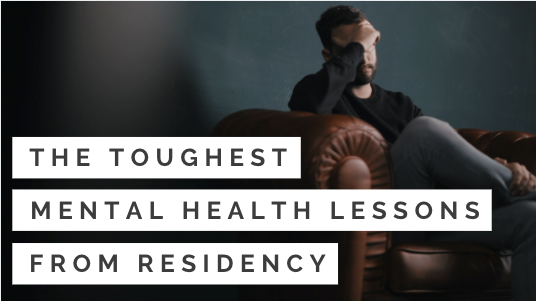The 5 Toughest Mental Health Lessons from Residency

This World Mental Health Day, I’m sharing huge lessons I learned during one of the toughest phases of my life that inspired me to make this blog in the first place: pharmacy residency.
When I started residency there was one thing I knew: I was going to learn a helluva lot about my specialty. What I did NOT realize, and what you can’t know until you’ve gone through it, is how far your mental health gets tested, how far you fall, and how strong you can come out of it with the right support, humility, and will. I will not claim that residency is the hardest thing a person can go through. However, difficulty is relative and individual; what matters is what we learn from it. I also want to emphasize that my support structure of mentors, friends, and family helped to build me back up when I couldn’t see how anything could get better. Lean on your resources, lean on yourself, and lean into the struggle. You’ll be surprised and impressed with what you can handle.
1. Saying no. Starting out, you really want to impress because you’re basically on a constant interview and never want to disappoint. This translates you into any request for your assistance with tasks and projects results in a yes. And it becomes a vicious cycle of doing the extra work you said yes to instead of the minimum requirements and leaves you less essential mental recovery time. Over time I learned that if you know what your values and goals are, it makes prioritizing your activities easier. The first time I said no was over 6 months into the first year. It wasn’t actually a verbal “no” to someone, it was a not volunteering for something I knew I was skillfully capable of. While there are of course many requirements to complete residency, you have choices on what you do in your limited spare time. Be strategic for yourself instead of being a yes-person for everyone else.
2. Seeking and accepting help. This is something so many of us have difficulty with. Personally, I don’t want to burden others with my problems, but there came points in residency when I had no choice. I learned a few things:
a. If someone offers to help, assume it’s because they genuinely want to. If you’re someone who offers help to others, this is a virtue you can recognize in others as well.
b. Once you accept help, you’ll notice that teamwork more often than not gives better results. #synergy
c. Help keeps you humble. You learn more about other people’s abilities and strengths that are different from your own which is a beautiful thing.
3. Change. When you have every minute of the day planned and crammed with that never-ending to-do list, the inevitable unpredictable events will happen - especially in healthcare. You have two choices: accept it, or don’t. What I’ve learned is that if you resist change, you lose battles more often. This isn’t to say you need to be a yes-person and follow change blindly, but seek to understand its purpose and contribute to the change’s success.
4. Self-doubt. This one is hard. It’s uncomfortable. It makes me want to hide under my blankets and never come out. It multiplies imposter syndrome. Here’s what to do: lean into this feeling. It forces you to reflect what it is you’re doubting, and why. This is when I really need to rely on my support system. During one of my worst episodes of self-doubt, one of my residency mentors hugged me for a full minute in her office while I cried on her shoulder. After I let that out, she gave me an assignment. She had me write down 10 things that I liked about myself and was proud of. I could only think of 8, and she filled in the rest for me plus more. It wasn’t an instant fix, but it was the first step to pick myself up brick-by-brick and come out of it with more self-love and empowerment.
5. Failure. In residency (and in life), you will have failures. You will not reach one of your goals you set. You will get bad feedback from preceptors, some of which is non-actionable. You will make mistakes. When this happens, don’t hide from it. Don’t sweep it under the rug and pretend it didn’t happen. Don’t blame others. Instead, self reflect. Recognize what happened and how your actions may have led you there. Acknowledge how it could have been prevented and make it a lesson for your mental toolkit. Because the important truth is, you will fail again.
Despite all of the tough days, the stress, the breakdowns, the self-doubt, the wondering if I could finish; I can honestly say I don’t regret it. Without the experience I wouldn’t have hit walls, break through them, and rebuild a stronger ones. If you’re in a difficult phase of your life where you’re in a tunnel, I hope these can provide you with tools start seeing the light.

Comments powered by Talkyard.